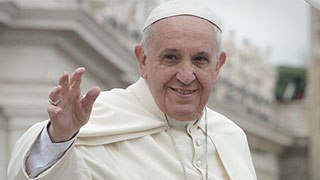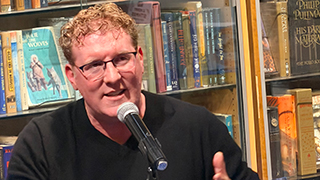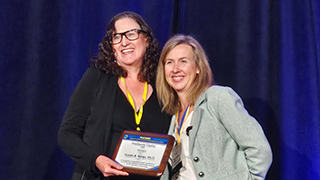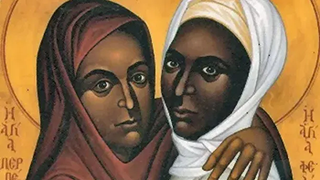Inside the Core: Screenings of The Lord of the Rings
Friday, October 17, 2025
 We are looking forward to a very special series of film screenings of The Lord of the Rings: The Fellowship of the Ring, coming up on the next three Tuesdays, October 21, October 28, and November 4, from
6-9 p.m. in the Campus Ministry Lounge in Boland Hall. For each evening, we will
screen approximately an hour of the film, preceded by a brief introduction by a faculty
member, who will connect that particular part of the film to Pope Francis’ Laudato Si, his ground-breaking work on the links between faith and care for the environment,
now in its tenth year. The film screenings will be followed by discussion led by
the professor who did the introduction. Though we have the lounge till 9 pm to allow
everyone to discuss and hang out afterward, the actual event and formal discussion
should be over by about 8 pm. This special series is sponsored by the University Core, Campus Ministry, and the English Club.
We are looking forward to a very special series of film screenings of The Lord of the Rings: The Fellowship of the Ring, coming up on the next three Tuesdays, October 21, October 28, and November 4, from
6-9 p.m. in the Campus Ministry Lounge in Boland Hall. For each evening, we will
screen approximately an hour of the film, preceded by a brief introduction by a faculty
member, who will connect that particular part of the film to Pope Francis’ Laudato Si, his ground-breaking work on the links between faith and care for the environment,
now in its tenth year. The film screenings will be followed by discussion led by
the professor who did the introduction. Though we have the lounge till 9 pm to allow
everyone to discuss and hang out afterward, the actual event and formal discussion
should be over by about 8 pm. This special series is sponsored by the University Core, Campus Ministry, and the English Club.
Our faculty presenter for Oct. 21 is Eric Johnston, Ph.D. associate professor of Immaculate Conception Seminary School of Theology, an avid LOTR enthusiast and a theologian. On Oct. 28, our faculty presenter will be Michael Taylor, Ph.D. associate professor of Political Science and Public Affairs and the founding director of the interdisciplinary Environmental Studies Program. On Nov. 4, our faculty presenter will be Francis Hunter, adjunct faculty member in the Core and an instructor of English at Seton Hall Prep. Frank received his master’s and bachelor’s degrees in English at Seton Hall, where, in fact, I met him when he was an undergraduate in my Core III/English elective, Fantasy and Faith: Tolkien, Lewis, and their Precursors in 2019. It is exciting to me to welcome these wonderful professors into the discussion of Tolkien’s famous work in connection with Pope Francis’ encyclical.
Tolkien, who died in 1973, never read Laudato Si, of course, but his work, which we are studying this semester as I am teaching the class again, is informed by a view of nature deeply compatible with that expressed by Pope Francis in his text (a requirement in Core II). For example, in Section 11, he describes the attitude toward nature embodied by Saint Francis, one rooted in faith and the Scriptures:
If we approach nature and the environment without this openness to awe and wonder, if we no longer speak the language of fraternity and beauty in our relationship with the world, our attitude will be that of masters, consumers, ruthless exploiters, unable to set limits on their immediate needs. By contrast, if we feel intimately united with all that exists, then sobriety and care will well up spontaneously. The poverty and austerity of Saint Francis were no mere veneer of asceticism, but something much more radical: a refusal to turn reality into an object simply to be used and controlled.
More recently, in 2023, Pope Francis wrote a second work on the environment, the exhortation, Laudato Deum. In Section 2, #33, he writes, “In conscience, and with an eye to the children who will pay for the harm done by their actions, the question of meaning inevitably arises: ‘What is the meaning of my life? What is the meaning of my time on this earth? And what is the ultimate meaning of all my work and effort?’” These questions are crucial in this time, as climate change, as Francis clearly articulates in this document, has only increased since he wrote Laudato Si.
Pope Leo XIV has made it very clear he is committed to carrying on the legacy of Pope Francis, who, in turn, referred to Benedict XVI and John Paul II in Laudato Si, carrying on their legacy of concern for the environment. In a recent speech at Castel Gandolfo, Leo said, "God will ask us if we have cultivated and cared for the world that he created for the benefit of all and for future generations, and if we have taken care of our brothers and sisters - what will be our answer, my dear friends?" He has created an educational environmental center at Castel Gandolfo. He has also said, “We must pray for the conversion of so many people, inside and out of the church, who still don’t recognize the urgency of caring for our common home.”
So, how does this fait-inspired concern for the environment connect with Tolkien and LOTR? A devout Catholic, Tolkien depicts Nature as an expression of the hand of a divine Creator. All the good characters in LOTR appreciate and, in fact, show a reverence for Nature. Hobbits live peacefully in the Shire, cultivating the land and holding gardeners with respect (as is noted in the text, specifically). The Dwarves, who live in mountains, reverence the beauties taken from the earth, such as gems and gold, but do not mar the earth to retrieve them. Goblins, the wizard Saruman, and Sauron, all evil characters, do exactly that, marring the earth to exploit for their evil purposes. Elves, beautiful and aethereal people, respect Nature so much so that they live in deep connection with it. As Aragorn says of the Elves, “Indeed, deep in the woods they dwell,” as we see in both Rivendell and Lothlorien, homes of Elves, and in the latter case, where they live in the trees and are called “The Tree People.” There is much more to explore on this topic, but, suffice it to say, there is a wealth of material in LOTR that links to the sensibility of Laudato Si. Tolkien also lived out what he shows in his books, as he gave up driving a car in the 1940s in part because cars were spoiling the natural environment and loved trees so much, he is said to have wept seeing a tree cut down. What would he say today seeing the increase in the climate crisis and how much we still need to do to alleviate it?
If you have heard various perspectives on the subject of climate change, even some that ridicule and negate its reality or suggest that it is unimportant, perhaps you feel confused and don’t know whom to believe. If that is the case, I encourage you to come to the film screenings and explore these interconnecting texts (LOTR and Laudato Si). When it comes to the environment and the importance of our “care for our common home,” you can trust Pope Francis, Pope Leo, and, yes, J. R. R. Tolkien.
Categories: Faith and Service






